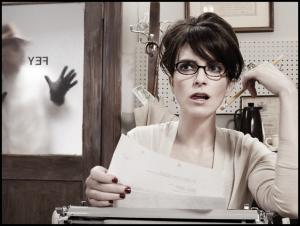Welcome | Log In
Introduction: The Donor Visit

Be Relaxed. Be Ready.
Tina Fey’s first big break: she got hired as a writer for Saturday Night Live. But she soon found herself frustrated by how the skits she wrote would play out, as a good bit of the acting on SNL is improvised, and what she'd written was never followed word for word. Then, after a few years writing for the show, her role expanded and she became a cast member (while continuing to write).
In a recent interview, Fey talked about her realization that a well-written script succeeds in part because it makes improvisation possible. She has come to describe the script-writing process itself as preparation for improvisation--the thought and effort of writing a script allows her perform a skit in what she calls a state of "relaxed readiness."
Isn't that just a perfect phrase? We all know exactly what relaxed readiness looks like. Whether on the face of an actor like Streep or an athlete like Jordan, we've all witnessed the look of someone so in control of the moment that they are utterly relaxed.
The work and preparation that goes into writing a good script gives Fey the confidence to be flexible and adaptable on stage. Going forward, we'll use Fey's term relaxed readiness when we encourage you to prepare (and prepare some more) so that you can be relaxed and ready during donor visits.
The Separation Is in the Preparation
We all work very hard to create our opportunities: we do research, develop a plan, schedule appointments, make travel arrangements--mostly things we’d rather not do, as we much prefer being with people--all in anticipation of a dialog with people who can make a difference for our organizations. The end result is you spend significant resources in both time and money for what may be no more than a 20-minute meeting.
The sections in Course 5 pertain to your preparation for the meeting and your execution of the entire engagement--from making the appointment to completing your follow-up and filing a stellar contact report.
We'll also review how to conduct yourself and how to control your environment. We must know how to control all the variables we can, and to set the stage so well by eliminating as many distractions that could negatively impact your efforts.